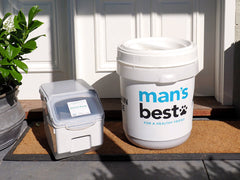
Is your furry friend experiencing digestive issues like upset stomach, diarrhea, or food sensitivities? It's time to embrace the benefits of grain-free dog food! In this article, we will explore why feeding grain-free dog food to dogs with sensitive stomachs can be a game-changer for their health.
With grain-free dog food, you can provide gentle nourishment to your furry companion. It eliminates common allergens, like wheat, corn, and soy, which can cause digestive discomfort in dogs with sensitive stomachs. By opting for grain-free options, you'll be giving your dog a diet that is easier to digest and less likely to trigger any adverse reactions.
Not only does grain-free dog food cater to your pet's unique dietary needs, but it also offers a host of other advantages. It is often packed with high-quality proteins, essential vitamins, and minerals that dogs need to thrive. Plus, grain-free dog food has been known to improve skin and coat health, boost energy levels, and support weight management.
So, if you want to ensure your dog's overall well-being and say goodbye to stomach issues, consider making the switch to grain-free dog food. Your loyal companion will thank you for it!
Understanding sensitive stomachs in dogs
Dogs, just like humans, can have sensitive stomachs. This means that their digestive system is more prone to irritation, leading to various digestive issues. Dogs with sensitive stomachs often experience symptoms such as vomiting, diarrhea, bloating, and flatulence. These symptoms can be caused by a variety of factors, including food allergies or intolerances, poor diet, or even stress.
It's important to understand that sensitive stomachs can impact a dog's quality of life. They can cause discomfort, pain, and even nutritional deficiencies if not addressed properly. That's why finding the right diet for dogs with sensitive stomachs is crucial.
Common symptoms of a sensitive stomach in dogs
Identifying whether your dog has a sensitive stomach is the first step in addressing their dietary needs. Some common symptoms to watch out for include:
1. Frequent vomiting or regurgitation: If your dog vomits frequently, especially after meals, it may indicate a sensitive stomach.
2. Diarrhea or loose stools: Dogs with sensitive stomachs often experience loose stools or diarrhea, which can be a result of food intolerances or allergies.
3. Flatulence and bloating: Excessive gas and bloating are common signs of a sensitive stomach in dogs.
4. Lack of appetite or selective eating: Dogs with sensitive stomachs may show a decreased appetite or become picky eaters, indicating digestive discomfort.
If your dog exhibits any of these symptoms, it's important to consult with your veterinarian to rule out any underlying health issues and determine the best course of action.
What is grain-free dog food?
Grain-free dog food is a type of pet food that does not contain any grains such as wheat, corn, or soy. Instead, it is formulated with alternative sources of carbohydrates, such as potatoes, sweet potatoes, or peas. The absence of grains in these formulas makes them ideal for dogs with sensitive stomachs.
Grains can be difficult for dogs to digest, especially those with sensitive stomachs. They can cause inflammation, digestive upset, and even allergies in some dogs. By eliminating grains from their diet, you can reduce the risk of triggering any adverse reactions and provide them with a gentler source of nourishment.
The importance of proper nutrition for dogs with sensitive stomachs
Proper nutrition plays a vital role in supporting the health and well-being of dogs with sensitive stomachs. It is crucial to provide them with a balanced and easily digestible diet to reduce digestive issues.
Grain-free dog food often contains high-quality proteins, such as lamb or fish, which are easier for dogs to digest. These proteins provide essential amino acids that support muscle development and overall growth. Additionally, grain-free formulas are typically enriched with vitamins, minerals, and antioxidants to promote optimal health.
When choosing a grain-free dog food for your furry friend, it's essential to read the label and look for ingredients that are easily digestible and beneficial for dogs with sensitive stomachs. Avoid artificial additives, fillers, and by-products that can potentially aggravate their digestive system.
Benefits of feeding grain-free dog food to dogs with sensitive stomachs
 Feeding grain-free dog food to dogs with sensitive stomachs offers numerous advantages. Let's explore some of the key benefits:
Feeding grain-free dog food to dogs with sensitive stomachs offers numerous advantages. Let's explore some of the key benefits:
1. Reduced digestive issues: Grain-free dog food eliminates common allergens like wheat, corn, and soy, which can cause digestive discomfort in dogs with sensitive stomachs. By providing a diet that is easier to digest, you can reduce the risk of digestive issues such as vomiting, diarrhea, and bloating.
2. Improved nutrient absorption: Dogs with sensitive stomachs often struggle to absorb nutrients from their food properly. Grain-free dog food, with its easily digestible ingredients, allows for better nutrient absorption, ensuring that your dog receives the essential vitamins, minerals, and proteins they need for optimal health.
3. Enhanced skin and coat health: Many dogs with sensitive stomachs also suffer from skin allergies or irritations. Grain-free dog food is often formulated with ingredients that promote healthy skin and a shiny coat. These formulas are rich in omega-3 fatty acids, which have anti-inflammatory properties and can alleviate skin issues.
4. Boosted energy levels: When dogs have a sensitive stomach, their bodies need to work harder to digest food, leading to decreased energy levels. Grain-free dog food provides a more easily digestible source of energy, allowing your dog to feel more energetic and active.
5. Weight management support: Some dogs with sensitive stomachs are prone to weight gain or obesity. Grain-free dog food often contains a higher percentage of proteins, which can help dogs feel fuller for longer and support healthy weight management.
Tips for maintaining a healthy diet for dogs with sensitive stomachs
Feeding your dog a grain-free diet is a great step towards maintaining a healthy diet, but there are a few additional tips to keep in mind:
Transition gradually: When switching your dog to a grain-free diet, it's important to do so gradually. Start by mixing a small amount of the new grain-free food with their current food and gradually increase the proportion over a week or two. This allows their digestive system to adjust to the new diet without causing any digestive upset.
Monitor your dog's response: Pay attention to how your dog responds to the new diet. Monitor their bowel movements, energy levels, and overall well-being. If you notice any adverse reactions or changes, consult with your veterinarian to determine the best course of action.
Consider other dietary factors: While grain-free dog food can be beneficial for dogs with sensitive stomachs, it's important to consider other dietary factors as well. Ensure that your dog's diet includes a balanced mix of proteins, carbohydrates, and fats. By feeding your dog from the range of Man's Best Grain Free Dog Food, you can be confident that these nutritional needs will be met. Created by a team of vets and pet nutritionists, every Man’s Best recipe is locally produced using only the best local ingredients to ensure your best friend has everything they need to support an active and healthy lifestyle.
Making the right choice for your dog's sensitive stomach
Feeding grain-free dog food to dogs with sensitive stomachs can be a game-changer for their health and well-being. By eliminating common allergens and providing a diet that is easier to digest, you can reduce the risk of digestive issues and improve nutrient absorption. Additionally, grain-free dog food offers a range of benefits, including improved skin and coat health, boosted energy levels, and support for weight management.
Remember to consult with your veterinarian to determine if a grain-free diet is suitable for your dog and to ensure that their dietary needs are met. With the right nutrition, you can provide gentle nourishment to your furry companion and help them live a happy, healthy life free from digestive discomfort. So, why wait? Make the switch to grain-free dog food and give your loyal companion the care they deserve
How to Transition to Grain Free Feeding
Here are our 7 steps to making the transition simple.
1.Consult your vet or pet store:
Before making any major changes to your dog’s diet, it’s always best to consult your veterinarian and discuss the options that would be best for your hound. Your vet will likely be able to offer advice and help you find a food that is balanced and contains all of the essential nutrients needed for optimal health.
2. Introduce the new food slowly:
When transitioning to a new food, start by introducing it slowly over the course of seven -ten days. Start by replacing just a small portion of their current food with the new one and gradually increase this amount over time. Mixing in 25% of the new food to begin with, and slowly increasing the levels until you have 100% grain free on the last day. This will allow your dog to get used to both the texture and taste of their new food, as well as help reduce gastrointestinal upset due to sudden dietary change.
3. Choose wisely:
Take into consideration your pup’s specific dietary needs before choosing a new food, such as age, breed size, allergies, or intolerances. Selecting something that is formulated specifically for those needs can help ensure that your dog is getting all of the nutrients they need for optimal health during each stage in life.
4. Stay consistent:
To keep things consistent make sure you are providing meals at regular intervals throughout the day as this allows them to adjust more easily over time. You may also want to mix feed with some raw food in addition to their dry kibble for an extra nutritional boost! Man's Best Premium Dog Food delivered to your door is a great choice for mixed feeding with raw food.
5. Monitor & adjust the dog food if needed:
To keep track of how your pup is adjusting to the new food you should observe them closely during this transition period and note any changes in what comes out the other end can suggest there is an issue with the type or amount of food they are being fed.
6. Avoid table scraps:
Though tempting at times, it's important that you avoid giving table scraps while transitioning them onto a new diet as this can cause GI distress which can further delay progress in switching foods successfully. It will eliminate the chance that it could be something other than the new dog food.
7. Practice routine mealtimes:
Meal times are moments where you bond with your dog so enjoy them! Dogs are creatures of habits and by keeping their mealtimes as regular as possible, this will help with transitioning to their new diet. It's always good practice to try out different recipes with different ingredients so find something both you and your pet will enjoy--happy eating! For more information about How To Transition Your Dog To A New Food, click here!
Remember, the key to switching your dog’s food is to transition slowly. Start by mixing the new formula with the old food and slowly reduce the amount of old food over 7-10 days until only the new formula remains. This transition time period will allow your pup to get accustomed to their new diet without overwhelming them. Good luck and if you would like the convenience of having grain-free dog food delivered to your door, give Delivery Hound a try!
Making the right choice for your dog's sensitive stomach
Feeding grain-free dog food to dogs with sensitive stomachs can be a game-changer for their health and well-being. By eliminating common allergens and providing a diet that is easier to digest, you can reduce the risk of digestive issues and improve nutrient absorption. Additionally, grain-free dog food offers a range of benefits, including improved skin and coat health, boosted energy levels, and support for weight management.
Remember to consult with your veterinarian to determine if a grain-free diet is suitable for your dog and to ensure that their dietary needs are met. With the right nutrition, you can provide gentle nourishment to your furry companion and help them live a happy, healthy life free from digestive discomfort. So, why wait? Make the switch to grain-free dog food and give your loyal companion the care they deserve
©deliveryhound.com.au 2023







